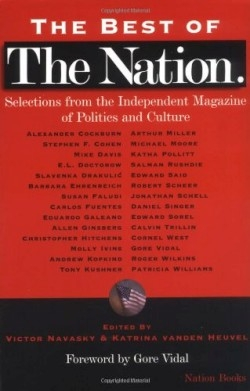The Best of The Nation
Selections from the Independent Magazine of Politics and Culture
For 135 years The Nation has been a feisty and opinionated magazine of liberal politics and culture. The Best of The Nation collects essays from the last ten years covering both familiar subjects, like the L.A. riots, and unfamiliar ones, like the politics of the American Booksellers Association, from fresh points of view. Few magazines would provide space to analyze the treatise written by the Unabomber; fewer still would have published Michael Moore’s essay lambasting the liberal elite (read: The Nation).
Part of the strength of The Nation has been its willingness to analyze and critique liberalism itself. In “We Need a Radical Left,” Ellen Willis argues that if the left would state exactly what it believes—instead of seeking middle ground—the people would follow; while Richard Rorty believes that the left should gather around a common group of goals for legislation, dropping all the grand conversation about “principals.” This dedication toward seriousness doesn’t keep The Nation from printing an occasional humor piece, like Molly Ivins scathing report on the 1992 Republican Convention.
The essay writing in The Best of The Nation provides analysis and insight beyond the daily news cycle. In “The Gulf War As Total Television” Tom Engelhardt discusses how the government gave the media exactly what it needed in 1990: a scripted war. When corporations swallowed media outlets and took on debt in the eighties, they reduced personnel to cut costs. “This is what the Bush Administration seemed to offer in the Gulf War—an outside production company able to organize a well-produced, subsidized total event that could be channeled to the American public at, relatively speaking, bargain-basement prices.”
For those who view The Nation as primarily a political magazine, there will also be the pleasant surprise of articles on the arts, culture, and book reviews. In “Hip Is Dead” Tom Frank suggests, “hip is no longer any different from the official culture it’s supposed to be subverting.” Why? Because the language and attitude of being out of the mainstream has been absorbed by marketing professionals. After all, weren’t both the Beatles’ “Revolution” and William Burroughs co-opted to sell tennis shoes?
The editors decided to print only one article from each writer and long time readers may feel that only one Katha Pollitt or Alexander Cockburn article isn’t enough. This choice though, like The Nation itself, is a democratic one that allows space for multiple views on issues ranging from affirmative action to the book industry. The Best of The Nation promises more than an overview of the headlines of the last ten years; it offers thoughtful analysis concerning many on-going political and cultural issues.
Reviewed by
Ronald D. Lankford, Jr.
Disclosure: This article is not an endorsement, but a review. The publisher of this book provided free copies of the book to have their book reviewed by a professional reviewer. No fee was paid by the publisher for this review. Foreword Reviews only recommends books that we love. Foreword Magazine, Inc. is disclosing this in accordance with the Federal Trade Commission’s 16 CFR, Part 255.

